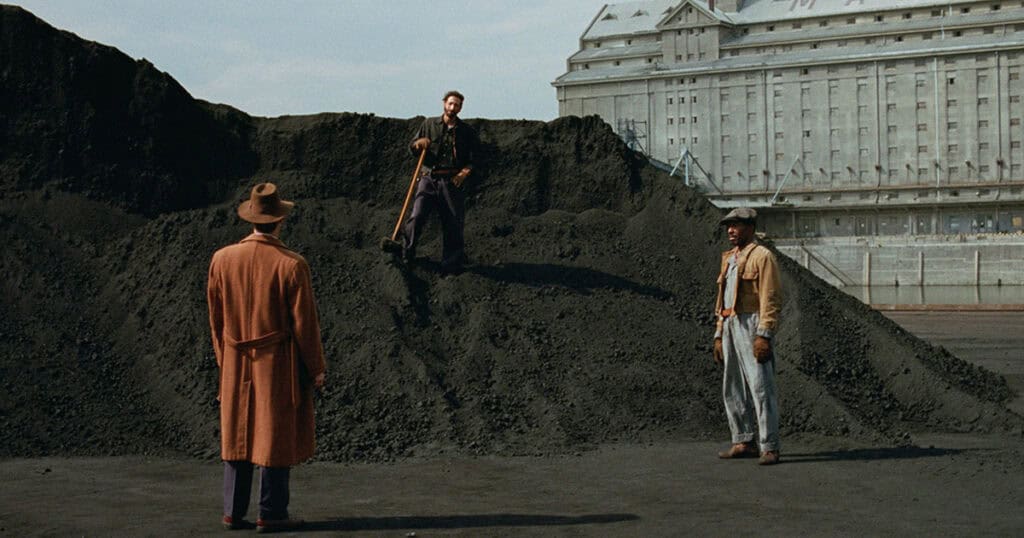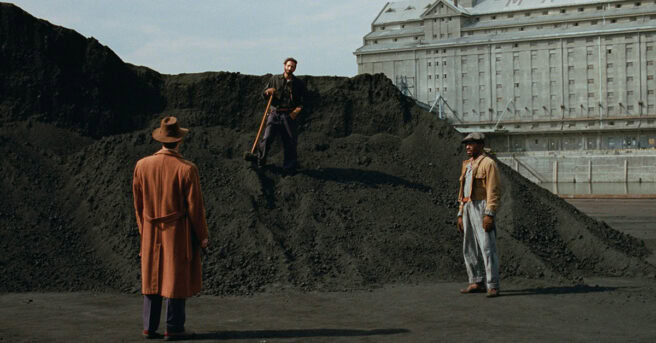
PLOT: In the aftermath of WW2, László Tóth (Adrien Brody), a Hungarian-born Jewish architect who survived the holocaust, emigrates to America. While there, he gets a taste of the American dream from a wealthy benefactor (Guy Pearce), although success may carry a price too difficult to bear.
REVIEW: It would be fair to say there hasn’t been a movie like The Brutalist in about forty years. One-time actor Brady Corbet, who emerged as a director following The Childhood of a Leader and the underrated Vox Lux, makes movies in the vein of David Lean, with this telling a deeply personal story on an epic scale the likes of which we haven’t seen in a long time. Shooting in 70mm VistaVision, The Brutalist is a three-and-a-half hour masterwork (with an intermission) that will go a long way towards establishing Corbett as one of the great modern directors.
Indeed, The Brutalist is a full meal (I skipped all the TIFF screenings after it because I needed to digest what I’d seen for a while). It’s a whole lot of movie, but right from the opening scenes, where Adrien Brody’s Toth arrives at Ellis Island and gets a first glimpse at the Statue of Liberty as Daniel Blumberg’s masterful score blares, you know you’re in the hands of a master of his craft.
Adrien Brody has his best role since The Pianist as Toth, who’s survived the holocaust and now has to make do in an America that views him as an interloper. Going to work for his Americanized cousin (Alessandro Nivola), he gets lucky when he scores a gig designing a library at the urging of a Pennsylvania playboy (Joe Alwyn) who wants to surprise his father (Guy Pearce). When the patriarch sees the Bauhaus-style library, he has a fit but eventually sees the light and becomes Laszlo’s benefactor.

However, the man, Harrison Lee Van Buren, is a tyrant, castigating Laszlo for employing a black man (Isaac De Bankolé) as his assistant and never letting him forget who his boss is. Brody and Pearce are electric opposite each other, with both clearly relishing sinking their teeth into truly great roles after years of toiling (at times) is smaller-scaled fare. Pearce, in particular, has never played a role like Van Buren, with him hiding his sadism behind a polished mid-Atlantic accent similar to the one used by John Huston when he played one of the screen’s great villains in Chinatown. Pearce plays him as a man of great charisma but little in the way of scruples. Yet, he’s not two-dimensional; he is also capable of great compassion, even if it comes with an asterisk.
While Brody dominates The Brutalist as Laszlo toils for his place in post-war America, with the wounds of the holocaust driving him towards self-destruction through a horrible heroin habit, he has an amazing foil in this movie. Felicity Jones plays Laszlo’s wife, Erzsébet, who finally rejoins them (with their mute niece – played by Raffey Cassidy- in tow) after many years. While physically weak, with her wheelchair-bound, she’s portrayed as a woman of great intellectual and mental strength. She only shows up in the film’s second half (after its intermission), but she has a few of the film’s most arresting moments.
Corbet, who wrote the movie with his partner Mona Fastvold (an accomplished filmmaker in her own right), does an excellent job crafting an allegorical tale that can be applied to anyone who’s ever struggled to overcome personal trauma by creating meaningful work. Technically, this is impeccable, with cinematography by Lol Crawley that makes the most of the 70mm format and the locations filmed in Budapest, Italy and more. Truly, this is a sprawling work.
The Brutalist was the toast of the Venice Film Festival and is already taking TIFF by storm. If it comes out this year and it’s given a proper push, it would be reasonable to expect it to be a major Oscar contender in most categories, with acting nods a no-brainer for Brody, Pearce and Jones. However, it also demands to be seen theatrically, as more than any movie since Oppenheimer, it’s been designed to be enjoyed as a cinematic event – and those belong on the big screen. Hopefully, audiences can see it how intended, as this is pretty close to being a masterpiece.
The post The Brutalist Review: A 3.5 Hour 70mm Masterpiece? appeared first on JoBlo.

Leave a Reply